ACRE
Spain’s PM orders thousands more troops and police to flood-hit Valencia
PUBLICADO
1 ano atrásem
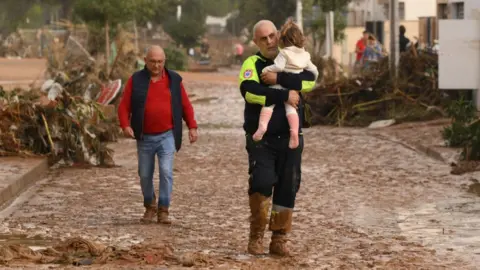 Getty Images
Getty ImagesSpain’s prime minister has ordered 5,000 more troops and 5,000 police officers and civil guards to the Valencia region as residents criticise local authorities over their response to catastrophic flooding.
Pedro Sánchez said 211 people have been confirmed dead, with the toll expected to rise further.
Heavy rains that began on Monday caused floods that destroyed bridges and covered towns with mud, cutting off communities and leaving them without water, food or electricity.
Sánchez said the deployment was Spain’s largest in peacetime, in response to one of the worst floods in Europe this century.
The prime minister said he was aware “the response that is being given is not enough” and acknowledged “severe problems and shortages”.
He said there are still “desperate people searching for their relatives. People who cannot access their homes. Homes destroyed and buried by mud. I know we have to do better.”
Weather warnings remain in force in north-eastern and southern Spain through Sunday, while another was issued in the Balearic Islands for Saturday.
Around 1,700 soldiers are already working on search and rescue operations in the Valencia region, although hope of finding more survivors is dwindling.
Part of the focus is on pumping water out of underground tunnels and car parks, where it is feared people were trapped as water surged in.
Paco Polit, a journalist in Valencia, told the BBC the new troops would bring in much needed heavy machinery, bulldozers, trucks, and help to improve the speed and organisation of the rescue efforts.
Sánchez said some places are still “suffering from lack of basic resources”.
He vowed that teams would work tirelessly until aid reaches everybody and people’s lives have returned to normality – and called for national unity.
Authorities have restored electricity to more than 90% of homes, and brought back almost half of telephone lines that had gone down, he added.
The government also authorised 100 interim civil servants to help distribute financial aid.

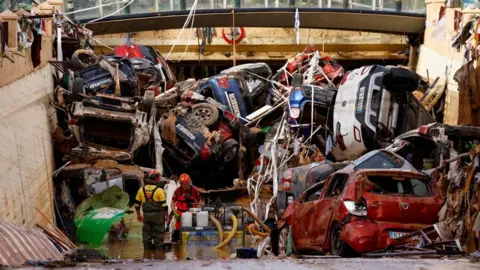 Reuters
ReutersLocal authorities are facing criticism over the speed of the response and for a lack of warnings in advance of the flooding.
Amparo Andres, who has owned her shop in Valencia for 40 years, told the BBC that at one point the water in the building reached her neck and she believed she was going to die.
“At least I’m alive, but I’ve lost everything. My business, my home,” she said.
“And the government isn’t doing anything. Only the young people around are helping us.”
The civil protection agency, overseen by the regional government, issued an emergency alert to the phones of people in and around the city of Valencia after 20:00 local time (19:00 GMT) on Tuesday, by which time the flood water was swiftly rising in many areas and in some cases already wreaking havoc.
Juan González, who lives in the town of Aldaia, said the area was prone to flash flooding.
“It’s outrageous that our local government didn’t do anything about it, knowing that this was coming,” he said.
In the devastated town of Paiporta, where more than 60 deaths have so far been reported, residents have expressed their frustration that aid is coming in too slowly.
Unsure whether it was safe to return to home, Amparo Esteve told the BBC: “No-one is helping us. I’ve never been in a war, but this is what it seems like.”
The federal government in Madrid is also facing criticism for not mobilising the army sooner than it did and for declining an offer from the French government to send 200 firefighters to help with search and rescue efforts.
Sánchez has vowed to do whatever it takes to help those affected by the disaster.
Volunteer clean-up efforts in Valencia – organised largely by young people on social media – saw columns of thousands of people march to the areas most affected by the flooding.
Organisers at the city’s Ciutat de les Arts museum said at least 15,000 volunteers arrived on Saturday morning alone to join recovery efforts there.
Desperate to help, Pedro Francisco, 16, told the BBC he had been waiting in line with his parents for four hours.
“We have to do whatever we can,” he said. “It’s just terrible to see what has happened.”
Also queuing was Oscar Martinez and his wife and son.
“I feel anger,” he said. “This was an avoidable tragedy. All the regional government needed to do was to give us the flood warnings in advance.”
On Friday, the local authorities said traffic would be limited in the Valencia metropolitan area between 00:00 local time on Saturday and 23:59 on Sunday.
Local head of infrastructure Martínez Mus said the move had been taken to ensure emergency services could use the roads freely and to guarantee the supply of water, energy, communications, and food distribution.

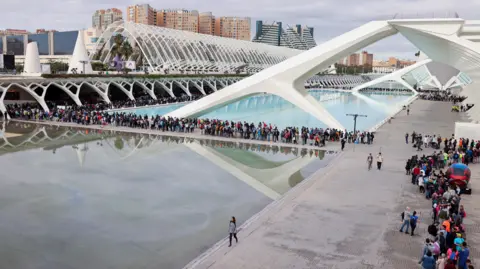 Reuters
ReutersIn response to looting, Sánchez said he would double the number of civil guard and national police on the streets, after more than 80 people were arrested.
Areas across the south – including Huelva and Cartaya – have also been hit by heavy rains, while hundreds of families in the city of Jerez have had to be evacuated from their homes.
One of the reasons the flooding has been so severe is a lack of rainfall during the rest of the year, which left the ground in many areas in the east and south unable to absorb rainwater efficiently.
The region of Chiva near Valencia saw as much rainfall in one eight-hour period on Tuesday as it would normally see in an entire year, according to state meteorological agency Aemet.
The warming climate is also likely to have contributed to the severity of the floods.
In a preliminary report, World Weather Attribution (WWA), a group of international scientists who investigate global warming’s role in extreme weather, estimated that the rainfall was 12% heavier than it would otherwise have been, and that such weather even itself was twice as likely.
Additional reporting by Christy Cooney and Bethany Bell
Relacionado
VOCÊ PODE GOSTAR
Imran Khan supporter protests: Why Pakistan’s capital is on lockdown, with internet shutdowns and thousands marching
‘Esta catástrofe é maior do que muita gente pode imaginar’: os brasileiros voluntários em Valência
Spain’s apocalyptic floods show two undeniable truths: the climate crisis is getting worse and Big Oil is killing us | Spain
ACRE
Em caravana, ministro da Educação, Camilo Santana, visita a Ufac — Universidade Federal do Acre
PUBLICADO
6 dias atrásem
25 de fevereiro de 2026A Ufac recebeu, nesta quarta-feira, 25, na Reitoria, campus-sede, a visita do ministro da Educação, Camilo Santana, no âmbito da caravana Aqui Tem MEC, iniciativa do Ministério da Educação voltada ao acompanhamento de ações e investimentos nas instituições federais de ensino.
Durante a agenda, o ministro destacou que a caravana tem percorrido instituições federais em diferentes Estados para conhecer a realidade de cada campus, dialogar com gestores e a comunidade acadêmica, além de acompanhar as demandas da educação pública federal.
Ao tratar dos investimentos relacionados à Ufac, a reitora Guida Aquino destacou a obra do campus Fronteira, em Brasileia, que conta com R$ 40 milhões em recursos do Novo Programa de Aceleração do Crescimento (PAC). A estrutura terá seis cursos, com salas de aula, laboratórios, restaurante universitário e biblioteca.
Abordando a visita, Guida ressaltou a importância da universidade para o Estado e a missão da educação pública. “A Ufac é a única universidade pública federal de ensino superior do Acre e, por isso, tem papel estratégico na formação e no desenvolvimento regional. A educação é que transforma vidas, transforma o país.”
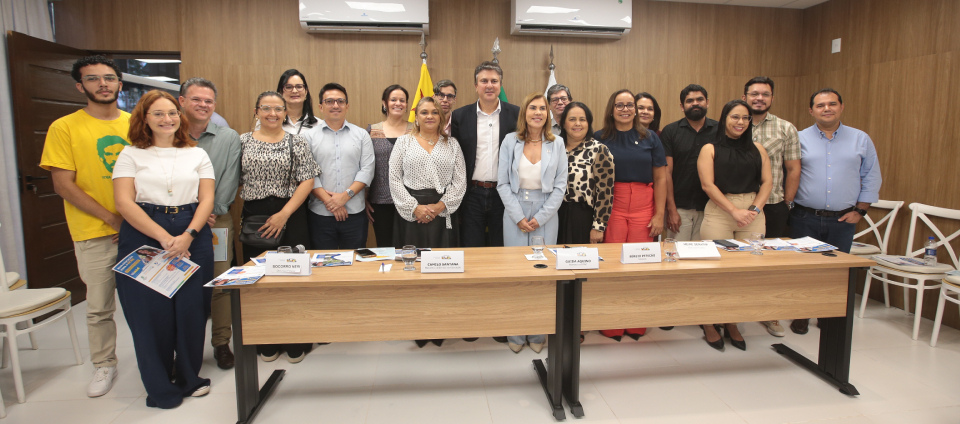
Outro tema tratado durante a agenda foi a implantação do Hospital Universitário no Acre. Camilo Santana afirmou que o Estado é o único que ainda não conta com essa estrutura e informou que o governo federal dispõe de R$ 50 milhões, por meio do Novo PAC, para viabilizar adequações e a implantação da unidade.
Ele explicou que a prioridade continua sendo a concretização de uma parceria para doação de um hospital, mas afirmou que, se isso não ocorrer, o MEC buscará outra alternativa para garantir a instalação do serviço no Estado. “O importante é que nenhum Estado desse país deixe de ter um hospital universitário”, enfatizou.
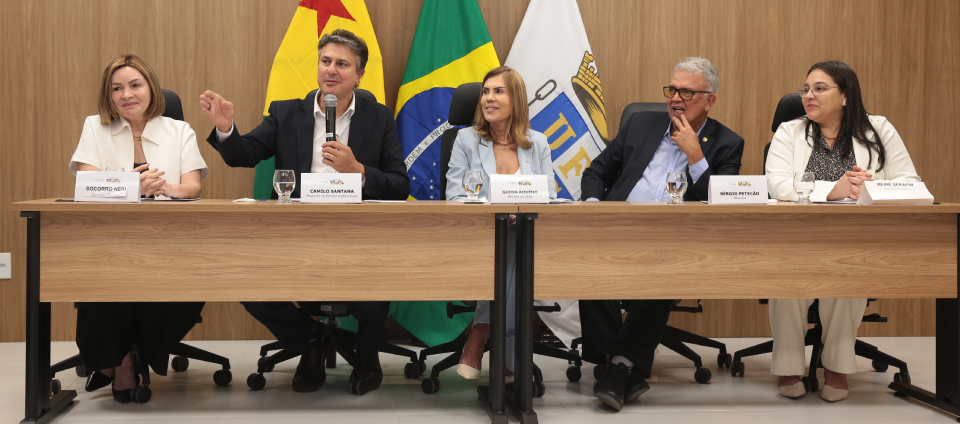
Guida reforçou a importância do projeto e disse que o Hospital Universitário já poderia ser celebrado no Acre. Ao defender a iniciativa, contou que a unidade contribuiria para qualificar o atendimento, reduzir filas de tratamento fora de domicílio e atender melhor pacientes do interior, inclusive em casos ligados às doenças tropicais da Amazônia. Em tom crítico, declarou: “O cavalo selado, ele só passa uma vez”, ao se referir à oportunidade de implantação do hospital.
Após coletiva de imprensa, o ministro participou de reunião fechada com pró-reitores, gestores, políticos e parlamentares da bancada federal acreana, entre eles o senador Sérgio Petecão (PSD) e as deputadas Meire Serafim (União) e Socorro Neri (PP).
A comitiva do MEC foi formada pela secretária de Educação Básica, Kátia Schweickardt; pelo secretário de Educação Profissional e Tecnológica, Marcelo Bregagnoli; pelo secretário de Educação Superior, Marcus Vinicius David; e pelo presidente da Empresa Brasileira de Serviços Hospitalares, Arthur Chioro.
Laboratório de Paleontologia
Depois de participar de reunião, Camilo Santana visitou o Laboratório de Paleontologia da Ufac. O professor Edson Guilherme, coordenador do espaço, apresentou o acervo científico ao ministro e destacou a importância da estrutura para o avanço das pesquisas no Acre. O laboratório foi reformulado, ampliado e recentemente reinaugurado.
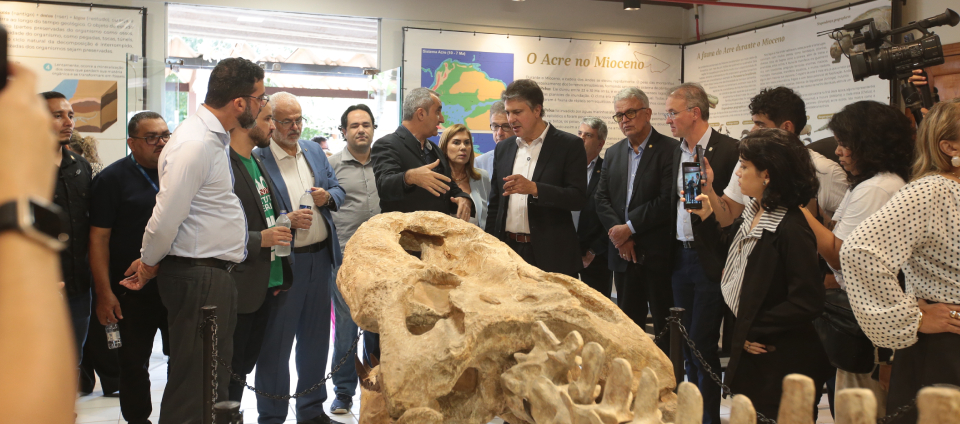
Aberto para visitação de segunda a sexta-feira, em horário de expediente, exceto feriados, o local reúne fósseis originais e réplicas de animais que viveram no período do Mioceno, quando o oeste amazônico era dominado por grandes sistemas de rios e lagos. A entrada é gratuita e a visitação é aberta a estudantes e à comunidade em geral.
Relacionado
A Pró‑Reitoria de Graduação (Prograd) da Universidade Federal do Acre (Ufac) é o órgão responsável pelo planejamento, coordenação e supervisão das atividades acadêmicas relacionadas ao ensino de graduação. Sua atuação está centrada em fortalecer a formação universitária, promovendo políticas e diretrizes que assegurem a qualidade, a integração pedagógica e o desenvolvimento dos cursos de bacharelado, licenciatura e demais formações presenciais e a distância. A Prograd articula ações com as unidades acadêmicas, órgãos colegiados e a comunidade universitária, garantindo que os currículos e práticas pedagógicas estejam alinhados aos objetivos institucionais.
Entre as principais atribuições da Prograd estão a coordenação da política de ensino, a supervisão de programas de bolsas voltadas à graduação, a análise e encaminhamento de propostas normativas e a participação em iniciativas que promovem a reflexão e o diálogo sobre o ensino superior.
A Prograd é organizada em três diretorias, cada uma com funções específicas e complementares:
Diretoria de Apoio ao Desenvolvimento do Ensino — responsável por ações estratégicas voltadas ao desenvolvimento de metodologias, à regulação e ao apoio pedagógico dos cursos de graduação.
Diretoria de Apoio à Formação Acadêmica — dedicada a acompanhar e apoiar as atividades acadêmicas dos estudantes, incluindo estágios, mobilidade estudantil e acompanhamento da formação acadêmica.
Diretoria de Apoio à Interiorização e Programas Especiais — voltada à gestão de programas especiais, políticas de interiorização e ações que ampliam o acesso e a permanência dos alunos em diferentes regiões.
A Prograd participa, ainda, de iniciativas que promovem a reflexão e o diálogo sobre o ensino superior, integrando docentes, estudantes e gestores em fóruns, encontros e ações que visam à atualização contínua dos processos formativos e ao atendimento das demandas sociais contemporâneas.
Com compromisso institucional, a Pró‑Reitoria de Graduação contribui para que a UFAC cumpra seu papel educativo, formando profissionais críticos e comprometidos com as realidades local e regional, garantindo um ambiente acadêmico de excelência e responsabilidade social.
Ednacelí Abreu Damasceno
Pró-Reitora de Graduação
Relacionado
ACRE
Orientação sobre revalidação e reconhecimento de diplomas — Universidade Federal do Acre
PUBLICADO
7 dias atrásem
24 de fevereiro de 2026Orientações para abertura de processo administrativo e procedimentos acerca da revalidação de diploma de graduação e reconhecimento de diplomas de pósgraduação stricto sensu emitidos por instituições estrangeiras, conforme a Resolução CEPEX Nº 003, de 14 de março de 2017.
Abertura do Processo
I – Preenchimento do Formulário Padrão (conforme modelo disponibilizado);
II – Documentos pessoais exigidos:
• Cópia do documento de identidade para brasileiros ou naturalizados, e, se estrangeiro, cópia da identidade e do visto permanente, expedido pela Superintendência da Polícia Federal, ou passaporte com visto permanente, concedido pela autoridade competente;
• Comprovante de residência;
• Comprovante de quitação com o serviço militar, para brasileiros do sexo masculino;
• Comprovante de quitação com o serviço eleitoral, para brasileiros e naturalizados;
III – Documentos acadêmicos exigidos:
• Para revalidação, conforme Art. 10, da resolução CEPEX Nº 003, de 14 de março de 2017.
• Para reconhecimento, conforme Art. 33, da resolução CEPEX Nº 003, de 14 de março de 2017.
IV – Preenchimento do Termo de aceitação, exclusividade e autenticidade, conforme modelo disponibilizado pelo NURCA;
V – Solicitação de abertura de processo no Protocolo Geral da UFAC, direcionado ao NURCA, com a apresentação da documentação exigida nos itens de I a IV;
Submissão da documentação na Plataforma Carolina Bori – Link: http://plataformacarolinabori.mec.gov.br
O interessado deve submeter a documentação no formato .pdf, agrupando diferentes documentos em arquivo único conforme indicado abaixo:
Arquivo 1 em .PDF:
1. Formulário Padrão preenchido (conforme modelo disponibilizado);
2. Documentos pessoais exigidos:
a) Cópia do documento de identidade para brasileiros ou naturalizados, e, se estrangeiro, cópia da identidade e do visto permanente, expedido pela Superintendência da Polícia Federal, ou passaporte com visto permanente, concedido pela autoridade competente;
b) Comprovante de residência;
c) Comprovante de quitação com o serviço militar, para brasileiros do sexo masculino;
d) Comprovante de quitação com o serviço eleitoral, para brasileiros e naturalizados;
Arquivo 2 em PDF:
1. Diploma e Histórico (Itens I e II do Artigo 10 ou Itens II e IV do artigo 33 da Resolução nº 003, de 14 de março de 2017);
Arquivo 3 em PDF:
1. Documentos acadêmicos exigidos excetuando-se os do Arquivo 2:
a) Para revalidação, conforme Art. 10, da resolução CEPEX Nº 003, de 14 de março de 2017.
b) Para reconhecimento, conforme Art. 33, da resolução CEPEX Nº 003, de 14 de março de 2017, excetuando item III (vide Arquivo 5).
Arquivo 4 em PDF:
1.Termo de aceitação, exclusividade e autenticidade, preenchido conforme modelo disponibilizado pelo NURCA; da resolução CEPEX Nº 003, de 14 de março de 2017.
Arquivo 5 em PDF:
a) Para os casos de reconhecimento: Exemplar digital da tese ou dissertação com registro de aprovação da banca examinadora e documentações complementares, conforme item III do Art. 33 da resolução CEPEX Nº 003, de 14 de março de 2017.
Fluxo do Processo
VI – Recebimento do processo pelo NURCA e encaminhamento para o Centro pertinente, que constituirá Comissão;
VII – Retorno do processo ao NURCA no prazo de 15 dias;
VIII – Sendo favorável o parecer da Comissão, será autorizada a emissão de GRU, bem como, o seu devido pagamento (R$ 1.200,00 – graduação; mestrado – R$ 1.500,00 e doutorado R$ 2.000,00), devendo ser incluída a via original ou cópia autenticada por servidor da UFAC no processo de revalidação.
a) Em caso de parecer negativo, o processo será disponibilizado para consulta, retirada de documentação e/ou ajuste quando for pertinente.
IX – Retorno do processo ao Centro para a Comissão concluir a revalidação no prazo restante dos seis meses.
Termo de Aceitação, Exclusividade e Autenticidade
_________________________________________________________________________________________________________
Links Úteis
Warning: Undefined variable $user_ID in /home/u824415267/domains/acre.com.br/public_html/wp-content/themes/zox-news/comments.php on line 48
You must be logged in to post a comment Login